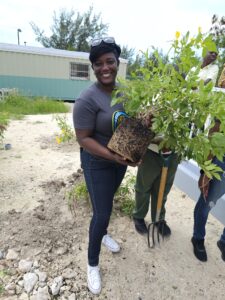TCI News
TCI: Mental Health in Adolescents
Published
7 years agoon

#Providenciales, April 3, 2019 – Turks and Caicos – The WHO defines health as “a state of complete physical, mental, and social well-being and not merely the absence of disease or infirmity…”. Mental health, specifically, is defined as not just the absence of a mental disorders but a state of well-being in which a person realizes their own abilities, is able to cope with life’s normal stresses, is able to work regularly and productively and is able to contribute to society. Good mental health is therefore the foundation for an individual’s and a community’s effective functioning and well-being. It is therefore critical to ensure the sound mental health of each individual beginning from childhood and throughout the lifespan. Hence as a society it is our duty and obligation to nurture and maintain the mental health of everyone, especially our children and adolescents. For the purpose of this article we will focus on adolescents.

Adolescence is defined as the developmental stage between ages 11 and 19/20 and is a time of great hormonal storms, decisions, pressures, identity formation, learning and personality formation. While many adolescents have good mental health, multiple physical, emotional and social changes, along with various risk factors (see beneath) can all make adolescents vulnerable to mental health problems. These factors can also determine the mental health of an individual into their adult life. This stage of life is also the time to develop healthy physical, emotional and social habits to secure one’s mental health and some of these positive habits will be discussed later.
Let’s review the statistics, according to the WHO:
- Of the world population 1 in every 6 persons is aged 10 to 19.
- 16% of the burden of disease & injury in the 10 to 19 age group is due to mental illness
- 50% of all mental health conditions start at age 14 but are largely undiagnosed or undetected, largely due to lack of knowledge, awareness and stigmatization.
- Globally depression is a leading cause of disability and illness among adolescents and the 9th leading cause of overall illness in that age group, with anxiety being the 8th leading cause.
- At its worse, depression can result in suicide and suicide is the 3rd leading cause of death worldwide among 15-19 year olds.
- Failure to address mental conditions in adolescence unavoidably results in physical and mental challenges in adulthood and consequently limits the ability to lead fulfilling lives.
- Childhood behavioral disorders are the 6th leading cause of disease burden among adolescents. Such disorders affect academic performance and usually lead to delinquency.
- Eating disorders such as anorexia, bulimia, binge eating disorder and body dysmorphic disorder normally emerge in adolescence and often co-exist with depression, anxiety and/or substance abuse.
- Mental health issues account for self-harm in adolescents and in 2016, approximately 62,000 adolescents died globally from self-harm.
- In 2016, interpersonal crime was the 2nd leading cause of death among older adolescent males.
Risk factors:
Some of the risk factors which predispose adolescents to mental illness include but are not limited to:

- Poverty and lack of opportunities, educational and otherwise.
- Physical, verbal, and emotional abuse, with special emphasis on sexual abuse.
- Parental neglect, abandonment, and incest.
- Violence and trauma at home and in the community.
- Harsh parenting and bullying.
- The stresses & struggle of identity formation as one fights for autonomy.
- Peer pressure to conform and experiment with different trends.
- Exploration of their sexual identity and sexual orientation.
- The extensive & inappropriate exposure to social media and technology.
- The disparity between their actual life and their perceptions/aspirations of the future.
- The quality of life at home and with their peers.
- Adolescents who belong to minority groups, are stigmatized or due to discrimination or exclusion.
- Chronic illness, developmental disorders, and disabilities.
- Teenage pregnancy and/or abortions, teenage parents, and those in early life marriages.
- Orphans.
- Exposure to alcohol and drug use at an early age.
- Genetic factors (hereditary traits of mental illness).
- Poor coping mechanisms and lack of social support systems.
Types of mental illness among adolescents:
While the array of mental health conditions is wide and varied, just a few common ones will be highlighted for the purpose of bringing greater awareness.
- Emotional disorders e.g. depression, anxiety, along with excessive irritability, frustration or anger and mood swings. These can also lead to clinical depression and bipolar disorder.
- Emotionally related physical symptoms e.g. stomach aches, headaches, nausea, acne.
- Behavioral disorders such as oppositional defiant disorder (ODD), conduct disorder, ADHD, and disruptive behavioral disorder.
- Eating disorders, such as anorexia nervosa, bulimia nervosa, binge eating disorder which are also linked to body dysmorphic disorder.
- Psychotic disorders such as schizophrenia in it’s different forms.
- Dissociative disorders such as dissociative identity disorder (also called multiple personality disorder) and depersonalization disorder.
- Suicide and self-harm.
- High risk behaviors e.g. drug use, promiscuity & unprotected sex, indulging in violent behaviors.
These conditions are chronic, long term conditions which can be controlled with medication, psychotherapy, and sound, consistent social support systems in the form of family, friends, mental health professionals, church and community. Once clients comply with their medication regimes and counseling and there is good support then the possibility of patients living a relatively functional life is high. Therefore, it is prudent to adopt the proactive approach in choosing prevention rather than cure when addressing mental illness, and being aware of the various risk factors empowers us to do so.
How do we nurture mental health in adolescents?

- Establishing healthy, regular sleep patterns as well as healthy daily routines for them.
- Providing a healthy diet and regular exercise for them
- Developing adaptive coping mechanisms; these should be taught/modeled by responsible caring adults. Teens look towards the adults in their life for guidance hence we must set the tone for behaviors if we wish to see them emulated.
- Teaching them how to develop good decision making skills. The decision making center of the brain does not fully develop until age 25, therefore it is crucial that we support our teens in their decision making.
- Developing healthy interpersonal relationships with everyone in their circle.
- Nurturing a healthy self-concept, with good self-esteem and self-worth.
- Teaching them to understand, appreciate, embrace and most importantly manage their emotions.
- Providing a happy, healthy home for them free of violence, abuse, aggression and anger.
- Remaining open and available for them to talk and share whatever they may need to.
- Spending quality time with them while you engage in healthy joint activities.
- Providing discipline in a way which they can understand and discuss and also setting boundaries for them to operate within.
- Remaining aware and interested in their life events, friendships, academic performance, and choices.
- Speaking positively into their lives and future and helping them plan for their future.
- Praising them for their efforts and accomplishments despite how seemingly small it may be; teens need to be encouraged especially by those they hold in high regard.
- Being a reliable, responsible, dependable model to them in every way.
- Giving them opportunities to develop autonomy and think for themselves so that they can differentiate as healthy individuals and not feel or remain overly dependent on others.
- Treating them with respect; speaking with them and not with negativity and condescension.
- Ensuring regular medical checkups and observing your teen for changes and challenges they may be experiencing.
- Placing realistic expectations on them and not making unreasonable demands. Each teen is unique with their own competencies and capabilities and therefore they should not be compared to others. Comparison brings unnecessary pressure, frustration, and discontent as teens often struggle to meet unrealistic and unfair expectations set by the adults in their lives.
Remember our adolescents are the next generation of tomorrows world, the leaders, the innovators, the decision makers and the parents of another generation. It is therefore in the best interest of all society to nurture, maintain and preserve the mental health of this precious generation with the hope that they will be given the best chance for a bright and productive future and that they will do the same for those to come after them.
Therefore, we hope that this information has brought some level of insight and will serve as a motivating force in nurturing mental health in our adolescents.
References:

- Adolescent Mental Health: WHO.int/news-room/fact-sheets/detail.
- How to Promote Good Mental Health: promisesbehavioralhealth.com/mental-health
Release: TCIG
You may like
Independent writer
A Turks and Caicos we can all be proud of
Published
3 weeks agoon
January 15, 2026
What’s on my mind is a Turks and Caicos that deserves to be celebrated, not reshaped into something unrecognizable.
Yes, Providenciales has grown. It has welcomed businesses, ideas, and people from all over the world, and in many ways it reflects the beauty of a melting pot. But growth should not mean erasure. Progress should not require us to trade away the very soul of who we are.
There is a moment we are standing in right now that calls for intention. Stop. Pause. Preserve. Think ahead for the generations to come. All is not lost, but it can be, if we do not choose wisely.
Each Islander is unique to the island they are from. Even our dialogue carries the imprint of where we come from. Our accents, expressions, rhythms, and ways of telling stories quietly reveal our home islands. That is our power. That is our beauty. The true richness of Turks and Caicos lives in its people as much as in its landscapes. Exploring and preserving our islands must also mean exploring and preserving their inhabitants, their knowledge, their traditions, and their ways of life. We are not here to invent something foreign. We are here to shape and mold what we have already been given. God has already provided the blueprint. We only need to slow down long enough to see what is right in front of us.
No one knows your country or your product better than you who have lived it. Why try to be something we are not? Each time we attempt to imitate another place, we lose a piece of our own lifestyle. A lived experience is what gives us the authority to shape our present and our future.
I envision the marketing and development of our family islands not as replicas of somewhere else, but as island treasures. Places where businesses rise from culturally focused initiatives, designed first with residents in mind, and where visitors are welcomed into an authentic haven that reflects what Turks and Caicos truly represents.
North Caicos as a living sanctuary. Lush, green, and respected. A place for nature trails, wildlife exploration, farming traditions, and environmental exhibitions, where development works with the land, not against it.
Middle Caicos safeguarded for its history and natural wonders. Its caves protected not only as attractions, but as classrooms. Its flamingos preserved as symbols of the fragile beauty we are responsible for protecting.
South Caicos honored as the salt and fishing capital. The rhythm of boats, salt ponds, and sea life forming the heart of its identity. A working island where maritime culture and sustainable fishing are supported, celebrated, and passed down.
Grand Turk restored and respected as a cultural and historical anchor. Front Street with its light and British flare revived with intention. The return of a strong public library and cultural spaces for those who adore history, storytelling, and research.
Salt Cay protected in its quiet uniqueness. A picturesque island lifestyle centered on stillness, craftsmanship, heritage, and community.
The heart of this vision is not tourism alone. It is our people.
Celebrate our island cultures. Create small businesses that allow islanders to thrive with dignity, love, and respect. Build economies that sustain us without displacing us. Let development work in service of community, not the other way around.
Teach our youth the trades, the arts, the skills, and the stories while our elders are still here to pass them on. Boat building, straw work, farming, fishing, cooking, music, storytelling, herbal knowledge, construction, and design. These are not relics. They are foundations.
From this, innovation is born. When young people are rooted, they can modernize tradition without losing it. They can bridge yesterday and today. They can create futures that honor the past instead of replacing it.
We do not need to become a concrete jungle to be successful. We do not need to mirror other places to be worthy. We do not need to sacrifice our identity to attract the world.
What we need is the courage to protect what is left, the wisdom to shape what is coming, and the commitment to ensure that being a Turks and Caicos Islander is not just a title, but a living experience our people can still feel, recognize, and pass on.
From Alicia Swann
Turks and Caicos Islander
TCI News
Beaches Turks and Caicos sets the Benchmark for Biodiversity in the TCI
Published
2 months agoon
December 17, 2025
PROVIDENCIALES, Turks & Caicos Islands: — Beaches Turks & Caicos continues to lead the way in sustainability by cultivating a culture of environmental stewardship across the Turks and Caicos Islands. Through the introduction of biodegradable alternatives, agricultural education and community partnerships, the resort is setting a new standard for eco-conscious hospitality. As part of its ongoing sustainability mission, the resort has replaced single-use plastics and certain chemicals with compostable, biodegradable products derived from natural sources, to reduce pollution and minimize the resort’s carbon footprint.
culture of environmental stewardship across the Turks and Caicos Islands. Through the introduction of biodegradable alternatives, agricultural education and community partnerships, the resort is setting a new standard for eco-conscious hospitality. As part of its ongoing sustainability mission, the resort has replaced single-use plastics and certain chemicals with compostable, biodegradable products derived from natural sources, to reduce pollution and minimize the resort’s carbon footprint.
“At Beaches Turks & Caicos, sustainability is woven into every part of the guest experience,” said Managing Director, James McAnally. “From the products we use to the relationships we nurture, our goal is to make responsible environmental choices that benefit our guests, team members and the wider Turks and Caicos community.”
The resort also practices on-site composting, recycling fruit and vegetable waste from its kitchens to enrich soil and sustain its lush landscaping. This closed-loop system reduces waste and promotes biodiversity across the property.
landscaping. This closed-loop system reduces waste and promotes biodiversity across the property.
Beyond the resort, Beaches collaborates with local partners including schools, government agencies and NGOs to extend green education into the wider community. Through the Sandals Foundation, the resort supports projects such as the installation of water filtration systems, tree-planting activities and biodegradable workshops. Schools like Enid Capron Primary have expanded their farming projects and integrated agricultural science into their curriculum thanks to this partnership. Beaches also leads regular coastal cleanups and reforestation drives which inspires residents and students to play an active role in protecting their environment. “The Earth Guardian volunteers take pride in giving back to our schools and the communities we serve,” noted Public Relations Manager, Orville Morgan. “These initiatives create a sense of shared responsibility that strengthens both our communities and our natural resources.”
With its commitment to biodegradable innovation, sustainable education and environmental action, Beaches Turks & Caicos continues to set the benchmark for biodiversity and sustainability in the Turks and Caicos Islands.
Photo Captions
1st insert: Beaches Turks and Caicos and the Sandals Foundation celebrate with students at the Enid Capron Primary School in a Reading Road Trip experience where guests and students get to experience a cultural melting pot of activity.
2nd insert: Beaches Turks and Caicos resort Simone Woodfine from the Bar Department prepares to plant a tree at one of our schools to celebrate the mission of providing a healthier environment for the Turks and Caicos Islands
TCI News
Turks and Caicos Corporate Community Join Beaches Resort to Raise Funds for Jamaica’s Hurricane Melissa Relief
Published
2 months agoon
December 17, 2025
Turks and Caicos Islands, December 17, 2025 – Corporate partners in and around Providenciales recently joined Beaches Turks and Caicos Resort raising over US $54,000 to support Jamaica’s Hurricane Melissa Relief effort. The fundraising dinner, aptly titled, ‘One Caribbean, One Family, One Love’ saw over eighteen companies gather on Friday, December 12 to support the recovery of families and the rebuilding of communities affected by the category 5 storm.
Caicos Resort raising over US $54,000 to support Jamaica’s Hurricane Melissa Relief effort. The fundraising dinner, aptly titled, ‘One Caribbean, One Family, One Love’ saw over eighteen companies gather on Friday, December 12 to support the recovery of families and the rebuilding of communities affected by the category 5 storm.
“When our Caribbean family calls, we will respond with love,” said Deryk Meany, General Manager of the Beaches Turks and Caicos resort. “Today it is Jamaica that is affected, but tomorrow, it could be the Turks and Caicos or another neighbouring island. We are committed to serving our brothers and sisters and are deeply grateful to everyone who have donated to the cause.”
Since the passage of Hurricane Melissa in Jamaica on October 28, the Sandals Foundation has been working around the clock with local agencies and international partners to provide shelter essentials, food, and clean water, restore schools, and provide medical support to hospitals. Funds raised at the recent benefit dinner will help bolster the next phase of the philanthropic organisation’s support to rebuild schools and livelihoods in affected communities.
agencies and international partners to provide shelter essentials, food, and clean water, restore schools, and provide medical support to hospitals. Funds raised at the recent benefit dinner will help bolster the next phase of the philanthropic organisation’s support to rebuild schools and livelihoods in affected communities.
“As we continue to provide essential first-relief support, we have already begun our long-term recovery response,” says Patrice Gilpin, Public Relations Manager at Sandals Foundation. “Many schools, which are the cornerstone of stability, learning, and emotional support for our young ones, require urgent attention. This donation will go a far way in restoring a sense of normalcy in the lives of our youngest and most vulnerable.”
The One Caribbean, One Family, One Love fundraising dinner featured, amongst other things a silent auction of Sandals and Beaches Resort stays, airline tickets, spa services, catamaran cruise, and private chef dinner. The night’s four course meal was also spearheaded by the TCI’s 2025 Taste of the Caribbean silver medalist culinary team- all of whom volunteered for the event.
Resort stays, airline tickets, spa services, catamaran cruise, and private chef dinner. The night’s four course meal was also spearheaded by the TCI’s 2025 Taste of the Caribbean silver medalist culinary team- all of whom volunteered for the event.
Managing Director of the Northern Caribbean and Curaçao, James McAnally expressed delight at the outcome noting, “The success of this event is indicative of the power of partnerships to effect real change. We are grateful to the TCI business community, resort guests and our resort team for coming together and making this moment count.”
Photo Captions
1st insert: Sandals Foundation Public Relations Manager Patrice Gilpin (centre) accepts the cheque from Beaches Turks and Caicos resort General Manager Deryk Meany (left) and Managing Director of the Northern Caribbean and Curacao James McAnally
2nd insert: Members of the Beaches Turks and Caicos resort’s entertainment team were on hand to provide scintillating performances at the event
3rd insert: Beaches Turks and Caicos resort General Manager Deryk Meany (5th left) poses for the cameras with representatives of the Graceway Communities as he personally thanked those who were in attendance





